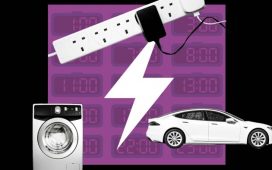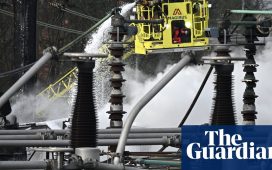Stay informed with free updates
Simply sign up to the UK energy myFT Digest — delivered directly to your inbox.
The boss of one of Britain’s biggest energy companies has urged whoever wins the general election to “tackle head-on” the practical and bureaucratic problems holding back the UK’s green transition.
Keith Anderson, chief executive of Scottish Power, said ministers needed to get to grips with issues ranging from skills shortages to lengthy planning and procurement processes that are slowing down the development of projects such as hydrogen plants and electricity cables.
“We’ve had lots of reviews . . . lots of conversations,” he said in an interview with the Financial Times. “In reality what has changed? Nothing.
“We are still using the same processes, we’re still having all the same conversations. Nothing has changed. Nothing’s got faster and nothing is any different.”
Scottish Power, part of Spanish energy giant Iberdrola, owns and invests in wind turbines, electricity grids and solar panels around the country, and also supplies energy to about 4.6mn households.
Anderson, who is a member of Prime Minister Rishi Sunak’s council of business advisers, said the UK had a “colossal” opportunity in clean energy but needed to “get on the front foot”.
“My frustration is, there are easy answers out there which do not cost money,” he added, highlighting reforms such as to the planning system as one area that could make a big difference.
“Fundamentally the process doesn’t work properly — you’re looking at these huge, big infrastructure projects; we need to move faster [ . . .] short circuit the process and get everybody in the room.”
Skills shortages were another area of concern, he said. “We need to get moving on it before it becomes a massive constraint.”
His comments reflect wider concern in the energy sector that the UK is not set up to deliver its ambitious decarbonisation goals.
The UK is legally committed to cutting its emissions to net zero by 2050, with Sunak’s government setting an interim goal of decarbonising the electricity system by 2035.
The opposition Labour party, which is ahead in the polls ahead of the general election on July 4, wants to do so by 2030. Both require a rapid increase in renewable power generation, with Labour aiming to quadruple offshore wind, triple solar power, and double onshore wind capacity.
Aurora Energy Research said in a report published in March that the UK was “well off course” for both the 2030 and 2035 targets, and power system decarbonisation would not be achieved until 2051 without a “major change of policy and market interventions”.
The 2035 target required “significant new interventions”, the consultancy added, while doing so sooner was “likely to be infeasible”.
If elected, Labour has pledged to set up a new state-owned energy company, Great British Energy, to help boost renewables by co-investing alongside the private sector.
Anderson urged it to focus on less mature technologies and areas where “the government can have the biggest difference”, adding: “If all you are is another bank, I don’t need another bank. It’s not going to change the planning process.”
He stressed that parent company Iberdrola was “incredibly supportive” of the UK, but noted the country faces competition from around the world.
“If Spain or America moves faster, then money will flow there faster,” he said. “That doesn’t mean we’re not going to spend the money in the UK.
“But I would rather spend this year, next year and the year after, than have to wait five years to get something through the planning system.”
A Conservative party spokesman said the Conservatives had taken “bold action to deliver a 500 per cent increase in renewables connected to the grid since 2010” and are “backing £100bn of investment into the energy industry”.
Labour said it was confident its plan to decarbonise the electricity grid by 2030 could be delivered, pointing to the target’s endorsement by Sir Patrick Vallance, former chief scientific adviser. Its plans would “cut bills and make our country energy independent” a spokesman added.
Climate Capital

Where climate change meets business, markets and politics. Explore the FT’s coverage here.
Are you curious about the FT’s environmental sustainability commitments? Find out more about our science-based targets here











